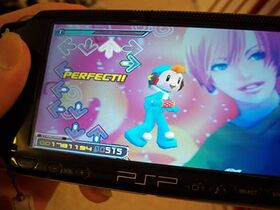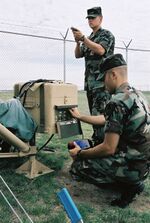PlayStation Portable
The PlayStation Portable (PSP, also known as PornStation Portable) is a Sony handheld system created by slaves working for the same jealous people who made the Virtual Boy. It is famously known for having one screen rather than two, which many people are thankful for as the Nintendo DS fucks with their mind. It also plays movies on UMDs but who cares that fad only lasted like a year and who the fuck wants to watch FMJ on a tiny screen anyway?
UMD[edit]
The PlayStation Portable uses UMD (Utility of Mass Destruction) type discs rather than cartridges (no exciting acronym here). They hold up to 1 hour of good gameplay, therefore, longer games start to decline in quality until you don't want to play them anymore.
History[edit]
In 1976, an event known as the "Hacker Sacking" occurred. Twelve Japanese soldiers, busy breaking into an American network in hope of finding pornography, were ambushed and taken back to an American base hidden in sacks; the Japanese soldiers were unable to defend themselves whilst using their PSPs. The Japanese government decided that anyone busy operating a PSP would have to have some chance of defending themselves. A team of researchers came up with the idea for the UMD: when a small catch on the front of the PSP was released, a small but effective nuclear disk was launched out towards the target. The blast from the disk was strong enough to take down two tanks within close proximity or fifty soldiers.

The effectiveness of the UMD was questioned in 1984, after a number of Japanese soldiers had been among the fatalities of their own UMD's. In recent years, UMD's have apparently been re-marketed in a number of Eastern European countries as an effective, low cost, drain unclogger.
"Universal" Media Disc[edit]
"Universal Media Disc" is another backronym for UMD. This term refers to the fact that the UMD will only run on the PSP and will universally be useless for any other machine, player, or console. Sony views this as a personal accomplishment, and laughs at those who do not see it their way.
Firmware Upgrades[edit]
A source of much annoyance among the home brew software development community is the regular firmware upgrades released by Sony which disables third-party code running on the PSP. Updates are forcibly administered by swarms of Sony branded nanites; failure to comply with the nanites intentions usually ends with them reassembling your entire molecular structure into a particularly pungent variety of French cheese.
However, the actual reason for these upgrades is to mask the fact that the PSP is actually built upon the obsolete hardware of a hyper-intelligent 5th generation Japanese toaster oven. To prove this claim, simply insert a urine drenched swab into the PSP's USB socket. The unit will, as any reputable Japanese home appliance does, issue a detailed report on your physical health including blood sugar, cholesterol, and lead-based paint consumption levels.
Important Upgrades[edit]
- ∞.00 (Dec. 17, 2011): Turns your PSP into a PlayStation Vita and hardchanges the wallpaper to a picture of bacon.[citation needed]
- ‽.00 (Aug. 13, 2009): Fixes a critical bug in the Matrix. (Credited to "Neo")
- †.00 (May 21, 2007): The "Jesus Update", which allows your PSP to be used in heaven.
- 6.66 (June 6, 2006): Gives your PSP the ability to have WiFi anywhere, even in hell. It may randomly shoot fireballs in any direction though.
- 2.00 (August 26, 2005): Adds a variety of amazing features which you will never forget.
List of PSP Models[edit]
During its lifespan, the PSP went through multiple models. Unlike the Nintendo DS, PSP models do not differ from each other at all. In fact, the provided "improvements" might actually be due to manufactural inconsistencies (read: they messed up while making a batch of PSPs and said it was a new feature).
- PSP-1000 - the "original" model.
- PSP-2000 - the battery life is imp- *blink* *blink* *shuts off*
- PSP-3000 - slightly thinner (?).
- PSP Go - does everything wrong and sucks.
- PSP 2 - see Successor section below.
The PSP-E1000 does not exist. I repeat, it does not exist.
The specifications are, unsurprisingly, the same across all models. The CPU for example runs at a clock speed of 333MHz (less if Sony doesn't like you).
Price[edit]
The PSP "Value Pack" was originally released in the United States with a price tag of an arm, a leg, and your left testicle. It is important to note that in Japan it was sold for the greatly reduced price of an arm, a leg, and half of your left testicle. Recently, Sony released a bundle package, the "Giga Pack". The main difference is that a Memory Stick™ with enough memory to actually be useful was added (due to high demand on more space for more porn), and the price was increased to your first-born child.
In Spring 2007, the PSP "Tera Pack" was released, giving the PSP a terabyte of memory. Although this memory was very useful, the cost of the package was your Mother's Ovary, plus one half of your father's testicle or, if you wanted to, you could give both, and half a pint of virgin's blood.
In late Spring 2007, the PSP's price was cut to your ENTIRE reproductive system. Women could keep half a boob.
To the relief of many, Sony acknowledged the existence of money in 2008. Since then, the MSRP of the PSP has been $2500. Retailers usually lower that price though in order to actually sell PSP's.
Japanese retailers remain adamant about not lowering the price of the PSP (¥1,549,000 or $3874), citing continued purchases by questionable folk who appear to gather in a kind of tribe in order to hunt digital monsters. Recently, a shift has began to occur in the behavior of this people, causing a new mystery device simply known as a "3DS", to increase in sales.
Peripherals[edit]
LocationFree Booker T[edit]
The LocationFree Booker T was introduced to make use out of the terrible, expensive feature that was the LocationFree Player. It used USB-A to Mini-B cables and a standard toaster. It used a new Bread Format, UMB Universal Media Bread to much annoyance, as the DVB Dynamic Video Bread Bread Format was the leading bread format used in all toasters. The LocationFree Booker T also made very good Pop-Tarts and Eggos.
List of Games[edit]
Top Sellers[edit]
- Monster Hunter Portable
- Monster Hunter Portable 2
- Monster Hunter Portable 2G
- Monster Hunter Portable 3
Other Games[edit]
- Dance Dance Revolution
- Final Fantasy
- Kingdom Hearts
- LocoRoco
- Lumines
- Lumines 2
- Lumines 3: Brace your Manus
- Ridge Racer
- Shenmue 3
Rumors[edit]
Before Sony unveiled the PSP Go, rumors surfaced that the next PSP model was to be called PSP STOP!. It was supposed to sport -6GB of external memory and the relatively unknown Yellowtooth technology for wireless data transfer. All of this turned out to be untrue but was still believed by everyone as the counter rumor said that it was not going to have an UMD drive, a much crazier prediction. The PSP Go turned out to be the latter and was thus an utter failure.
Successor[edit]
“Why did you buy the same Gameboy again?”
The official successor to the PSP, the PlayStation Vita (it. dat OLED) does everything the PSP can, and adds a bunch of pointless costly features such as 3G, and touchscreens (only 8 years too late). It also has no UMD drive, which is oddly a good thing this time around.
List of PlayStation Vita Games[edit]
Did I mention the excellent graphical capabilities of the system? It can render realistic environments and detailed objects in an impressive resolution of 960x544 pixels, which will be delivered straight to your eyes via its 5 inch (you read that correctly!) OLED screen. What else do you need?
The PlayStation Vita currently retails at around $599.
| ||||||||||||||||||||||||||


